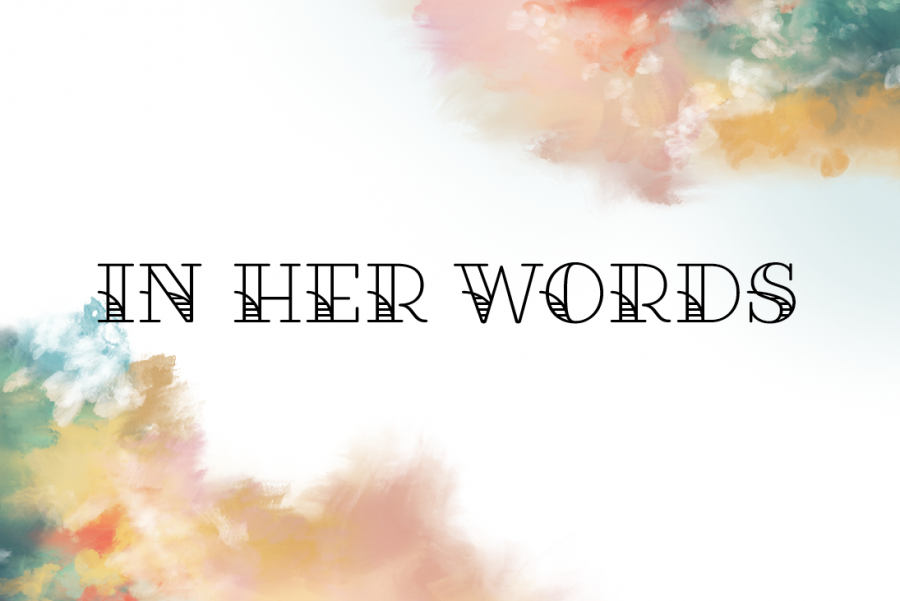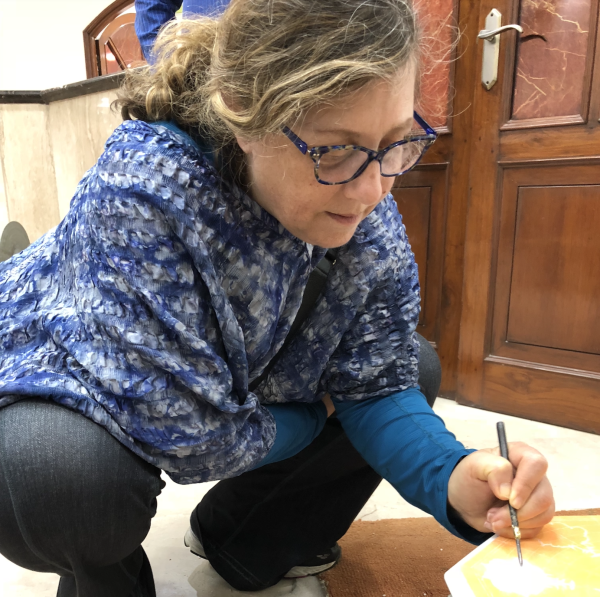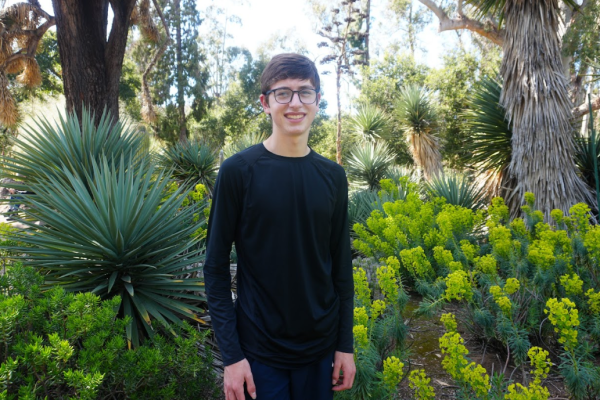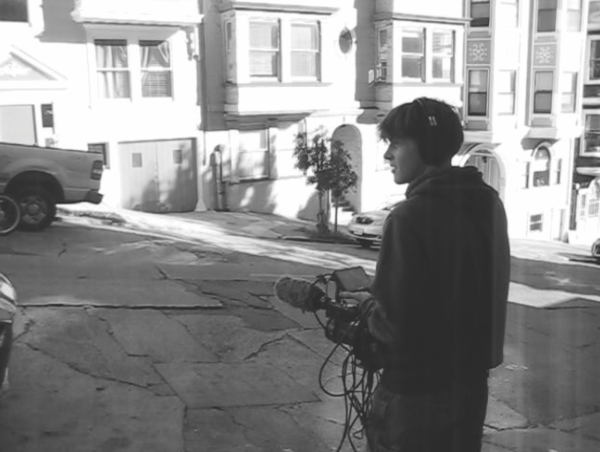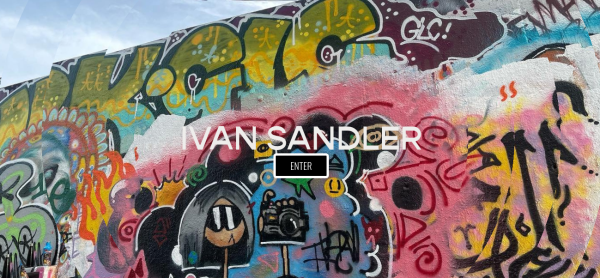In Her Words
The process behind featured artist Jasmine Kapadia’s contest-winning poetry
Captivated by the simple, no-rules writing style of poetry, Paly senior Jasmine Kapadia has been pursuing the literary craft ever since second grade when she was introduced to writing haikus by her teacher. “I didn’t have to worry about grammar,” Kapadia said. “I could just write and find my line breaks wherever I wanted to. I could, if I wanted to, write in all lowercase; that was allowed.”
Kapadia draws her inspiration from an array of sources, including visual artwork, music videos and different fashion styles, but perhaps the most influential thing to her work is her own identity. Through poetry, Kapadia has been able to express her own identity as a mixed Asian-American woman, often finding herself writing words she didn’t even know she was thinking. “It can be hard to form a solid concept of yourself,” Kapadia said. “For me, writing was a way to give myself a voice and give myself space to work through who I want to be, which parts of which culture I feel most connected to, or maybe if I don’t feel connected to a culture, why.”
Submitting her poems to different contests and magazines has been an incredibly rewarding experience for Kapadia, with her work being featured in an abundance of publications. However, the most meaningful of the awards she has received came not from a writing contest but rather a Good Morning America’s list of AAPI (Asian American Pacific Islander) inspirations.
An email sent to Kapadia revealed she had been nominated by world-renowned activist and Nobel Peace prize winner Malala Yousafzai for her poetry collection about the COVID-19 pandemic titled “tiger balm cures all but the smell trails”. The recognition was incredibly meaningful to Kapadia, both as a poet and an Asian American. “I think being an Asian American, or a minority or queer person, just being in this world…there is a burden that comes with that of representing a community,” Kapadia said. “And so I think having someone like Malala [say], ‘I see you, and I see what you’re doing, and you’re making waves.’ That was really exciting for me.”
There are a variety of writing contests and competitions available to teenagers, many of them with easy online entry. While finding opportunities is simple, Kapadia has found that lack of confidence in their work prevents many teens from entering. “I think, sometimes, if you’re writing, you’re like well, I’m not good enough,’” Kapadia said. “Or I’m not as good as these other people, so maybe I shouldn’t submit.’”
As Kapadia jots down her thoughts with pencil and paper, she often uses this time to reflect on her emotions and experiences while trying to navigate her identity. In recent years, she has continued to submit more poetry to competitions.
Kapadia understands that everyone will have their own understanding and takeaways from her poetry. “I want people to take [away] whatever they feel from it because my poems are an outlet for me,” Kapadia said. “Sometimes our emotions lie in a very dormant state, and we don’t really know how to tap into them, and sometimes words can help us do that and help us process.”
Kapadia’s advice to anyone struggling to communicate an oppressive emotion is to use poetry as an outlet. Creativity and expression have helped Kapadia understand the unexplainable. Poetry gives her the freedom to do as she chooses, and her writing is best when it comes from the heart. Gaining the attention of readers and receiving approval and praise are only added bonuses.
Through the years, Kapadia has navigated how to write without fear of comparison and people disliking her art. While she recognizes that this is difficult for aspiring poets, Kapadia believes the realization that your writing will not always be perfect is extremely important.
“You have to make mistakes and you’re going to have to learn the basics,” Kapadia said. “But if you can get past that and if you can give yourself grace and not judge your own work, your progress will be incredible.”
“leftovers” by Jasmine Kapadia
Previously published in Aurora Review
have u seen my body? u cracked eggs against the sycamore tree
asked me to pick out the shells with my teeth. take the A train at 10pm,
bus across the bridge
+ into the river. the water is always ice cold. crazy how we used to get
lost here, drown in city lights. u chase me down the sidewalk
peanut brittle between ur teeth, stoop under the wonton stall
breaking ur back contorting on the doorstep. here low-life fairytales come
to fruition, knife worked nine inches in
pulled out six. exorcism. midwives delivering red ink + roaches, baby crawling out
of my throat. tear my corpse apart to see it hit the pavement
spider carcasses piled at the church door to be dumped into tsap seui
+
such a long night.
“rediscovery” by Jasmine Kapadia
Previously published in the Aurora Journal lately when i see myself in the mirror i think i can visualize the ghosts of my hip bones jutting out of my skin. or maybe the shadows of my ribcage, dusted with sand. i study the tips of my fingers and imagine biting them off. i want somebody to sketch me, to study the wrinkles that form when i bend my wrist. i want them to draw hundreds of hand studies, all untitled. if they displayed them, would my family recognize me? would my friends? would i? sometimes i pull the bedsheets against my bare back just to feel something so flush against my body, myself within myself within myself all cocooned in white cotton. i swallow to taste the inside of my throat. it is okay to be greedy.
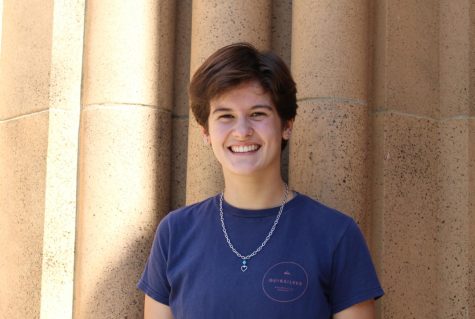
2021-2022 - Staff Writer
2022-2023 - Editor-In-Chief
I joined C mag because I saw it as a really cool way to learn more about the Paly community,...
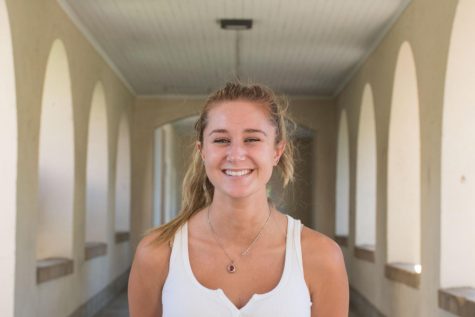
2020-2021 - Staff Writer
2021-2022 - Business Manager
Hello! My name is Natalie Hmelar, I am the C Mag business manager. I love being in C Mag because...


